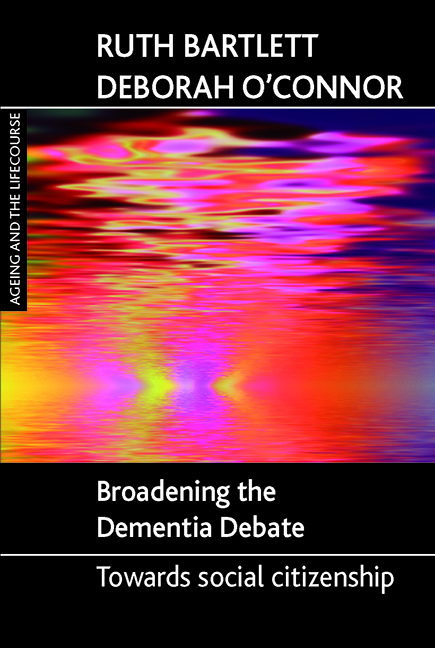five - Implications for social and health care practices
Published online by Cambridge University Press: 01 September 2022
Summary
Introduction
New ideas about social citizenship and dementia demand new forms of practice. In the previous chapter we drew on ideas associated with social constructionism to highlight the importance of considering how language is used to create understandings and to inform practice. We suggest that attending to the use of language is an important way for tuning into oppressive ideas and reshaping how we think about dementia in a way that is more congruent with a social citizenship lens. We argue that critical self-reflection is the first step towards a social citizenship approach to practice, and that attention to language provides an important entry point for this reflexive practice.
The purpose of this chapter is to move beyond thinking and begin to envision the doing of practice that is grounded in the ideas of a critical social citizenship approach. Specifically, we draw on the literature associated with critical1 social and health care practice to examine how professional practice in the field of dementia can be reshaped to reflect a social citizenship approach. We will pay particular attention to direct, case-based practice, recognising that this is where the majority of those who have professional responsibility for supporting people with dementia work. Simultaneously, however, we will be trying to begin to break down the artificial dichotomy between case-based practice (often positioned as micro level practice) and more macro level practices such as community and social development.
This chapter is organised into two sections. The first clarifies and examines the general principles for a social citizenship approach to practice. The starting point and basis for discussion is the conceptual framework advanced in Chapter Three. Using this framework, four principles are outlined to help provide the bridge between concept and practice. The second section highlights three strategic approaches for realising these principles. Combined, the goal of the chapter is to broaden the debate around dementia practice by putting forward a value-based approach to practice that is more explicitly political and congruent with social citizenship.
- Type
- Chapter
- Information
- Broadening the Dementia DebateTowards Social Citizenship, pp. 69 - 94Publisher: Bristol University PressPrint publication year: 2010

